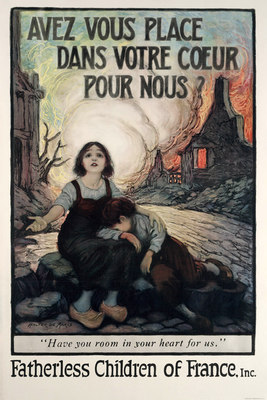
Description
This poster was issued by the Fatherless Children of France, a relief organization founded in 1915 to assist French youth whose fathers had been killed in the war. The artist depicts two children in the distinctive clothing of northern France, their vulnerability heightened by the smoldering ruins behind them. By 1915, the French government was unable to provide for the growing number of war widows. Yet it was calculated that a mere ten cents a day, or thirty-six dollars and fifty cents a year, would enable a child to be cared for at home rather than in an orphanage. The Fatherless Children of France arranged for subscribers to adopt a child, and, although the donors money was used for basic necessities, a primary goal of the organization was to educate and train the children to rebuild French society after the war. The Fatherless Children of France had several branches in America, and a stated goal of the organization was to foster ties of understanding and sympathy between the two countries. Accordingly, donors were encouraged to develop personal relationships with their adopted god child through letters, photographs, and gifts. In 1917, staff members of the Boston Athenum pooled their money and joined the Fatherless Children of France. They were assigned an eight-year boy, Marcel Huiban, whose father had been killed early in the war. Huiban lived with his mother and four siblings in Finistere, Brittany. For the next seven years, the Athenum staff sent money, gifts, and letters to their god child.
Details
- Dimensions:
- 30 x 20 inches
- Medium:
- Photomechanical print
- Credit Line:
- Gift of Bartlett H. Hayes, 1985